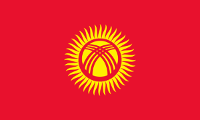Thinking about income
This stunned me today. As of 2013 the average monthly per capita income in Bishkek is 15,300 soms ($255). If you average in the rest of the country, the average monthly income is 12,000 soms ($200). When I go to the bank machine here, I usually withdraw 10,000 soms at a time, which is 5/6 of the average national monthly income. I am a member of the lower middle class (depending on one's economic model). Frankly, I am rich by most world standards.
Actually, I do find myself doubting the statistics for Bishkek, and I rather wonder if a huge part of the economy is not tracked. But the low salaries do seem to be confirmed by other sites. Consider for instance this bit from www.averagesalarysurvey.com; it sites yearly salaries, not monthly:
You will note some fairly high salaries. This particular website is exclusively English language, which implies to me that it will probably have quite a few non-Kyrgyz natives using it, so probably a chunk of the higher salaries are foreigners working in KG and receiving significantly higher salaries than the local KG people would.
Lamination: the six-case sheet lives on
Russian has confusing noun and adjective endings (which are called ‘cases’) so I usually distribute to my second-year students a reference sheet simply entitled “The six-case sheet.” I usually do that in the summers, too, once I find a place to laminate them so that they hold up better. Alas, I could not find any place that did that. Now I have, and not in international looking, big stores on a main street.
Two of the main streets of Bishkek are Chuy and Sovetskaya. Where they intersect there are underground passageways to cross the intersection so that pedestrians don't hinder the major traffic. And along these passageways are dozens of little kiosks/shops that sell this and that. This area is called a подходка by the locals, and within are some copy shops that have laminating machines. Whodathunkit?
So on Monday the students will have Livingston's world-renowned six-case sheet.
On not practicing medicine
The worst part of being a group leader is medical issues. Here you are with a group of twenty-somethings, and when something goes wrong, the sensible ones ask the advice of the group leader. But of course people in my position are not supposed to give medical advice or draw medical conclusions; that is what the university requires. It is also completely unrealistic. Someone in my position is going to give his opinion, and if he doesn't, then he is pathetic as a group leader, and you can be damn well sure that the students will regard him as a pseudo-parental failure.
Most of the time, of course, the medical stuff is non-serious, and the students can deal with it by themselves. For instance, on Friday student Marissa ate an entire pound of peaches; the resulting fiber bomb had predictable results on her digestive tract. Student Darwal found a Korean restaurant that served dog meat; he insists it was very tasty, but the results on his system were essentially identical to Marissa's.
But sometimes more serious things come up. Student Lewis has a congenital condition that sometimes results in paralysis of the legs, which struck him Saturday. The condition resolves itself with simple rest, no doctor nor medicine required. His host family, however, was quite concerned because he needed help getting back in the house on Saturday. On Sunday morn I made arrangements to visit his host family at one, and then I headed off to church. While my phone was off, the host family called our London School contact and said they wanted him removed from the home since they felt they couldn't care of him properly. Post-church I reviewed an e-mail from Lewis's dad, contemplated the link describing his condition, and headed to the host family. Truth to tell, I thought I would have to take him into my apartment, a thing group leaders have to do on occasion, but which was undesirable on this occasion because my apartment is on the second floor of a building, and Lewis's legs need rest. To my surprise, the family was willing to be persuaded to allow him to stay a couple more days and then re-evaluate the situation. I'm quite pleased. I wish I could say it was due to my stellar powers of persuasion: the art of persuasion is part of proving you are a "superior" speaker of a language, which I have never officially proven. But the truth is that it is just a very compassionate family. Lewis had already 10% convinced them, the elder daughter another 25%, and their kindness really just filled in the rest. One thing they were concerned about was whether Lewis could handle getting to the WC on his own, so I had him prove he could do it with a stool and rolling chair. Success! The youngest daughter in the family has a well-developed sense of responsibility and wanted to help him at every turn. Cruel me, I insisted he do it on his own, which he managed, and that was helpful in convincing them.
So why do I mention this story? Our London School contact really thought Lewis needed to go to a doctor. Lewis and his dad both thought otherwise. Their condition is common in people of Germanic descent and essentially doesn't occur among Asians. You don't find it among the Kyrgyz, and a Kyrgyz doctor will hardly have heard of the condition. Lewis and his dad have both participated in research on the condition; they are part of the cutting edge of exploring the disorder. The link I was presented with was consistent with their statements, so I felt it reasonable to do my part in persuading our locals that a doctor doesn't seem to be necessary. And frankly that is essentially practicing medicine. It something every parent with children has had to do; and parents know the fear that goes along with trying to figure out when something is serious and when it isn't.
And why do I think I succeeded in persuading the family on this occasion? Doubtless it was because I went to church this morning.
New names
Learning new names is always interesting. I'm currently in the Sierra Coffee shop; the barista's name is Lurlán. Among our teachers, all female, are the following names: Kenzhé, Altynái, Saikál, Saníra, Zakhída and Asél. Those are all Kyrgyz names. And of course there are plenty of standard Russian names: Yekaterina, Larisa, Maksim, Mikheil, and this morning's taxi driver Vladimir Yevgenivech. You'll laugh, but the Russian names are easy for me, and the Kyrgyz ones are still challenging.
Marvelous moments
While I was in the Sierra coffee shop this late afternoon working on e-mail, in walked a little Kyrgyz girl who was simply a ball of fire and personality. I'm guessing she was about 12, and she claimed the name Elmira, though I think that she first gave me a different Kyrgyz name. She charmed and amused the barista. Finally she got the courage to talk to me. (My reading glasses gave me away as a foreigner. Nobody here wears reading glasses in public.) I had a hell of a time understanding her. First she asked, «Где вы пошли?», which means "At where you went?" in Russian, but what she was trying to say was, "Where are you from?" It was vastly amusing. Here she is from some little Kyrgyz town, but she has blown into Bishkek like a tropical storm, determined to make herself known. Eventually we were joined as well by two bartenders from the adjoining Barclay's Pub, who also couldn't stop laughing. She asked me ten thousand questions about my family and was decimated to learn that I wasn't married and had no children. When I talked about my niece and nephew, she confused the words with grandchildren. And then again when she heard me talk about «дочь моей сестры» "the daughter of my sister", she said, "Wait! You said you didn't have children!" The barista had to explain to her the "of" construction in Russian. It was marvelous. I had never encountered a child before whose Russian was so weak, and as a linguist it was great fun.
Then she wanted to know about languages. Do I speak English? Yes, I do. Do I have a sister? Yes, she lives in Canada. Where is Canada? It's north of America. (She didn't understand the last bit; the bartenders explained it.) Can I sing her a song in English? I can: I sang her the first verse of the theme to "Gilligan's Island." Then she told me I have beautiful eyes. Can't fault her there... Then she asked if I knew any other languages? Yes, Spanish. Can you sing me something in Spanish? I couldn't remember anything in Spanish, but I could recite "En enero hace frío..." which pleased her mightily. And can I sing in German? I can: I sang her Zigeunerleben. And then I coerced her into singing something, which she did supposedly in German, although I'd be damned if I could recognize a single German word. And the tune was Billy Boy. Well, of course, I had to sing "Billy Boy" in English. So it was an afternoon of singing and laughing with a child and a barista and two bartenders.
I love these moments. First off, it teaches a young Kyrgyz girl that foreigners aren't scary. Second, it teaches the locals (in this case the barista and the bartenders) that foreigners are kind to children and have a sense of humor and can take themselves not too seriously. This is one of the reasons I think that good-hearted bilingual Americans should travel as much as possible. If you aren't bilingual but you are still kind to all you meet, then you can still travel and make a good impression. But if you want to travel abroad and want everything abroad to be like it is in the US, then maybe you should stay home. You haven't grown up enough yet to leave the American womb.
<< 1 ... 25 26 27 ...28 ...29 30 31 ...32 ...33 34 35 ... 43 >>


